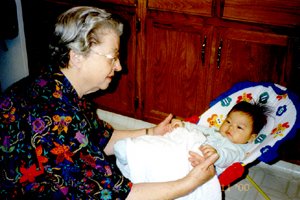My mother and I spent every Mother’s Day together doing things
like searching plant nurseries for unusual blooms, going to a bed
and breakfast in Half Moon Bay for the weekend, or watching the sea
otters at the Monterey Bay Aquarium.
My mother and I spent every Mother’s Day together doing things like searching plant nurseries for unusual blooms, going to a bed and breakfast in Half Moon Bay for the weekend, or watching the sea otters at the Monterey Bay Aquarium.
Sometimes we re-enjoyed her favorite movies, “The Horse Whisperer,” “Winged Migration” and “March of the Penguins.”
Last night I was remembering how I came into her hospital room one day shortly before she died, and mom was comforting Doris, her 88-year-old roommate.
They had their heads together like two little kids sharing secrets. Doris was telling her about how she had been raised in a foster home until she was 13 and how hard that had been. My mom and Doris had pushed their respective chairs as close together as possible where the curtain divided their halves of the hospital room, and they were holding hands.
My mom was saying, “It’s always the children who suffer,” and they were both weeping.
I was surprised because they had just met two days before. But I realized that my mom was crying not just for the helplessness Doris had felt as a child, but also for her own helpless situation of Stage IV lung cancer. Mom hadn’t allowed herself to cry more than a few tears when she was told she had 9 months left to live – which was really less than one month, as it turned out.
Later, when Doris was slowly shuffling toward the bathroom leaning heavily on her walker, she looked over at me and said, “We’re Doris and Louise!” and pumped her fist in the air, like the “Thelma and Louise” characters in the famous road trip movie celebrating feminine independence.
Mom and Doris were warriors together, staving off the inevitable for as long as they possibly could.
When my mother was growing up, communication in her family consisted of news about the weather or the neighbors, the prices at market, and instructions about the work being done on the farm. There was no room for emotional expression. Children were to be seen rather than heard. My mother never heard her mother once say, “I love you,” nor felt a single hug from her. The way my mother reacted to this upbringing was to give unconditional love to every child she met and to make caring for children her lifelong mission.
When my mom turned 17 in 1952, my grandparents decided it was time for her to leave home. They signed her up for business school and dropped her off at the local Greyhound bus station. Her world changed overnight from the rural 320-acre Comanche family farm where she had grown up, to life in the big Oklahoma City.
It took a year for her to save up enough to attend Oklahoma City University where she studied to become a teacher. She worked at a drop-in preschool. She and Mrs. Goforth were the only workers caring for 30 to 75 children, depending on how many moms dropped off their kids for the day.
At 22, mom answered the call for more teachers in California and moved across the country by Greyhound bus, bringing only her suitcase.
She worked every day with children the rest of us would rather not think about. To the severely disabled children she took care of each day, her work was a lifesaver. To those who needed her, even those who couldn’t see or hear her, her touch conveyed unconditional love. To her, she was just doing what she was meant to do.
Now, three years after her death, I still receive thank you notes from the parents of her students.
The one thing my mother always emphasized was the importance of listening.
Her favorite novel was one about a mysterious unseen listener who helps people from all walks of life, called “The Listener,” by Taylor Caldwell. I found it in her things recently, and it really took me back.
I remember how she said her job was not to teach me facts and figures, such as ABCs or how to read before kindergarten – her job was to teach me to listen. She said that is what I would need in order to learn all the rest that I needed in life.
Mom was right. Growing up, I used the listening skill she taught me in the classroom, and I now use it when I meet people. It also helps by getting to know and empathizing with my interview subjects. She taught me to listen between the lines, and to hear what they are saying nonverbally. Thanks to the love given by mom, I benefit from what she taught me every day of my life.















